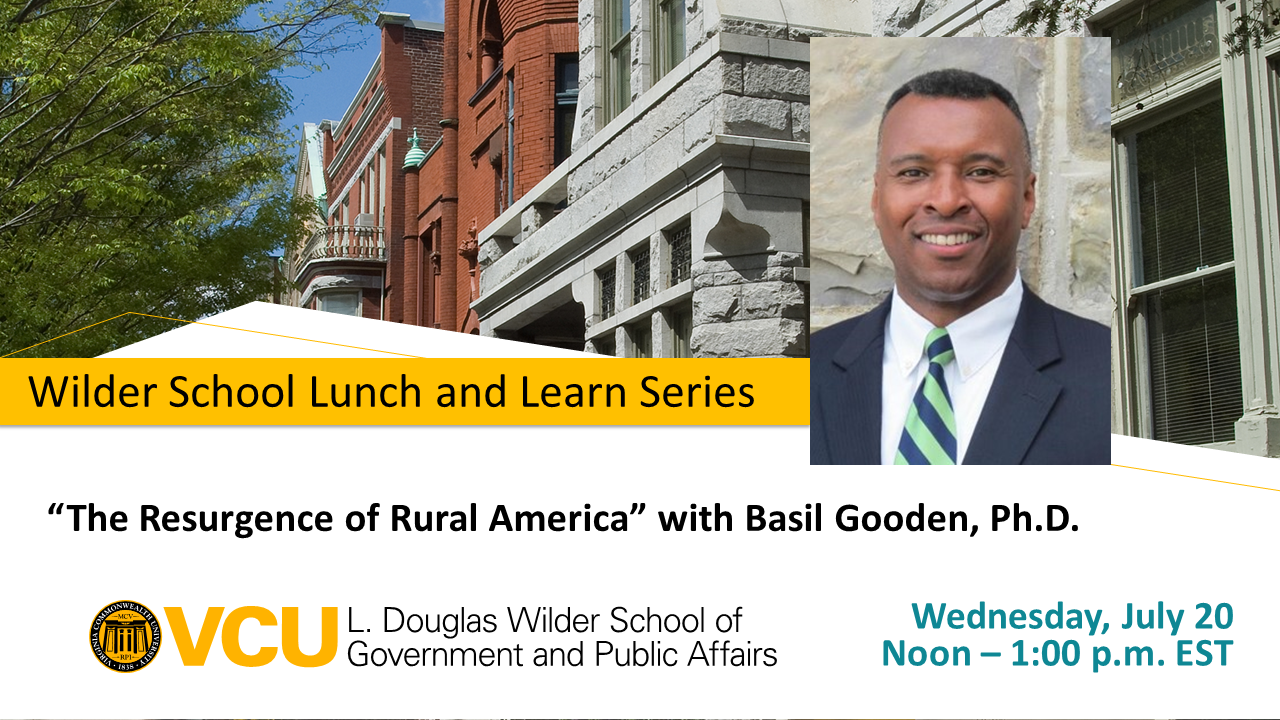News
"Exploring the Resurgence of Rural America" with Basil Gooden

by David Slipher
One in five Americans now lives in a small town. An unexpected result of the pandemic has been a steady increase in talent moving to rural areas as people reexamine their values, connections to family and work-life balance. What is next in this resurgence of rural America?
Basil Gooden, Ph.D., director of State Operations for USDA Rural Development, joined for a virtual discussion that examined the opportunities and challenges in areas of economic development, community-building and overall well-being in the transformation of what it means to live in rural America, now and in the future.
>> View the complete presentation on Youtube
Understand persistent demographics
Articulating what it means to be “rural” is a challenge, but according to U.S. Census data, approximately 46 million Americans live in rural areas, which by definition are those areas located outside the proximity of urban areas.
These rural populations have seen a decline over the past ten years, especially for younger people due to many economic factors. Rural areas are often plagued by persistent poverty, where 20 percent or more of the population is at or below the federal poverty line for four consecutive years. Gooden shared that many factors, like the pandemic, rising prices caused by inflation and unemployment have been especially challenging for rural communities.
“If America has a cold, minority communities have a flu or pneumonia,” said Gooden. “These persistent poverty areas, both in rural areas and in urban areas, actually are more susceptible to negative impacts related to health care education social justice.”
Connecting rural communities
With a move to remote working trends, providing access like broadband internet is key to improving accessibility for rural communities. As patterns shift, the USDA has developed grant programs to financially support technology investments.
“More and more people — skilled workers — are coming back to rural America to live,” Gooden said. “However, some are finding that the broadband infrastructure will not support the type of technology that they're they're requiring.”
“If they grew up and have some connection to rural America or rural Virginia, we can actually enlist them to help with some of the brain power. I'm an example of that.” - Basil Gooden, Ph.D.
Other local and regional governmental programs have negotiated incentives to encourage businesses to relocate to rural areas, which often are more affordable and accommodating than urban areas. Promoting entrepreneurship is also key and Gooden shared that about 65 percent of workers employed in rural areas work in small to mid-size businesses.
Expanding other critical infrastructure such as hospitals and healthcare services are vital, especially to fill shortages in medical workers. Encouraging tourism to rural America is another key investment, promoting natural geography and improving hospitality initiatives to attract vacationers.
Incentive programs are also offsetting costs for workers to relocate to rural areas. Gooden mentioned a northwest Alabama program that offers $10,000 for individuals to move to the areas and live there for at least 12 months. Repayment structures to relieve student loan debt are also growing across the country.
Looking to the future
Gooden emphasized that individuals, no matter their geographic location, can join efforts to support rural communities. Many alliances are developing across rural localities to promote their common cause. Citing his own experience, he sees opportunities for mission-based efforts to recruit more working professionals and bring their ideas to the cause.
“If they grew up and have some connection to rural America or rural Virginia, we can actually enlist them to help with some of the brain power,” Gooden said. “I'm an example of that.”
Gooden then fielded questions from webinar participants on topics including inflation, immigration, population changes, electric vehicle charging infrastructure and housing assistance.
>> View the complete presentation on Youtube
ABOUT THE SPEAKER:
Basil Gooden, Ph.D., was appointed in 2021 as director of State Operations for USDA Rural Development. He has spent his career advocating for rural economic prosperity, equitable food systems, agriculture policy, public health, and community and economic development. Prior to his current role, Gooden worked at VCU as a social work visiting scholar in the Sustainable Food Access Core of the Institute for Inclusion, Inquiry and Innovation (iCubed). In 2016, he was appointed to serve as the third secretary of agriculture and forestry for Virginia.
Gooden also served as the Virginia State Director for USDA Rural Development, working with the White House Rural Council, Virginia’s congressional delegation and members of Virginia’s General Assembly to address policy and regulatory issues directly impacting rural Virginia. From 2002-14, he served as the chief deputy director of the Virginia Department of Housing and Community Development, where he worked with diverse populations in low-income, high-poverty areas to create prosperous communities.
Prior to joining DHCD, Gooden worked at Virginia Tech as the coordinator of outreach and community relations. Additionally, he worked as an extension specialist with the Virginia Cooperative Extension. Some of his previous professional experiences include working as a legislative assistant to former U.S Rep. L.F. Payne of the 5th Congressional District of Virginia and serving as a legislative aide to former U.S. Sen. Charles Robb from Virginia. He has actively served as a board member of several statewide organizations, including the Virginia Agri-business Council, Council for Rural Virginia, Housing Virginia, EarthCraft Virginia, Preservation Virginia and the Virginia Cooperative Extension State Extension Leadership Council. He previously served as an adviser on the Buckingham/Cumberland County FSA County Committee.